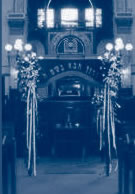|
SYNOPSIS: Sedra Noach: Hertz Chumash p.
26 Genesis Chap. 6 verse 9
This week's Sedra is generously sponsored by George Huppert.
The Flood
Of his generation, Noah alone was righteous and walked with
G-d. Utter destruction now threatened all living creatures
and G-d revealed His design to Noah, commanding him to build
a three-storied Ark, 150 yards long, 25 yards wide and 15
yards in depth, so that he and his family would be saved from
the impending flood. When the Ark was completed, Noah, his
wife, his three sons Shem, Ham and Japheth, together with
their wives, entered it, taking with them seven pairs of every
clean species of animals and one pair of every unclean species.
After seven days heavy rain fell continuously for forty days
and nights and huge waves of water erupted from the earth.
All living things outside the Ark were drowned. Five months
elapsed before the waters began to subside and the Ark rested
on the mountains of Ararat. After many more months had passed,
Noah released a raven to ascertain whether land had reappeared
but it flew to and fro as it could find no resting place.
At seven day intervals, he sent out a dove which returned
on two successive occasions but not on the third and Noah
then knew that the ground was dry. He and his family then
left the Ark in which they had lived for one year and ten
days. Noah offered sacrifices and G-d made a covenant that
never again would He destroy the whole of mankind by flood.
The blessing previously bestowed on Adam was repeated meaning
that Noah and his sons would rear families, populate the earth
and have dominion over all creatures. They were given seven
commands, among them not to eat the blood of animals or take
human life. As a visible confirmation of the covenant a rainbow
appeared in the sky.
The Vineyard:
Noah began to cultivate the ground and planted a vineyard.
After drinking wine, he became intoxicated and lay unclothed
in his tent. His son Ham, amused at the incident, told his
brothers Shem and Japheth who respectfully covered their father
with a garment. Noah awoke and, realising what had happened,
condemned Ham for his disrespect and foretold that his descendants
would become a servile race, whereas the generations of Shem
and Japheth would be blessed.
Tower of Babel:
After the death of Noah, the earth became repopulated through
the descendants of Shem, Ham and Japheth who were the founders
of numerous nations. At one time, mankind had been congregated
in Babylonia speaking one language. Fearing that they might
be dispersed, they decided to build a city and high tower
reaching towards the sky as a focal point to ensure that they
dwelt together and could achieve their evil aims. G-d, therefore,
confused the language of the builders so that they ceased
work as they could not understand each other and He scattered
the people over the face of the earth. The place was called
Babel, that is, confusion.
From Shem to Abraham:
The tenth in regular descent from Shem was Abraham whose
father, Terah, lived in Ur of the Chaldees in Babylonia. Ur,
at that time, was the main centre of moon-goddess worship
by the Sumerians, who, though a highly-developed cultural
race, were steeped in idolatry. Terah decided to emigrate
to the land of Canaan and left with his son, Abraham, his
grandson Lot and Sarah, Abraham's wife. On their journey northwards
they arrived at the city of Haran in Mesopotamia where they
stayed for some time and where Terah died.
HAPHTORAH HERTZ CHUMASH P. 41 Isaiah Chap 54 verse 1
Isaiah foresees the time when the exiles will return from
captivity and the cities of the Holy Land will be repopulated
more abundantly than ever before for G-d's anger was momentary
and a thing of the past. Just as He had sworn that the waters
of Noah should no more go over the earth, so His new covenant
of peace with Israel would be everlasting. The prophet calls
on rich and poor alike to participate in a spiritual revival
by returning to G-d and to His teaching.
TELL ME RABBI ........ KIDDUSH FOR SHABBAT
The fourth of the Ten Commandments requires us to remember
the Shabbat l "to make it Holy" (Ex 20,8). Apart
from refraining from forbidden activities, we are equally
required to invest the Shabbat day with Sanctity. One of the
ways this is achieved is by an oral declaration at the inception
of Shabbat with Kiddush.
Whilst initially Kiddush was included as part of the Amidah
prayer where it remains, the principal Sanctification is in
the home over a goblet of wine, considered a noble beverage
adding joy, celebration and significance to the occasion.
This is derived from "And you shall call Shabbat a delight
- Oneg" (Isaiah) i.e. where you "call" Shabbat
- i.e.Kiddush - there shall be your delight #1&3 (i.e.
eat and drink).
The Kiddush not only Santicifes the day, but also serves
to exalt the religious significance of the meal itself.
Rav, in the Talmud, links the wine for Kiddush with the Temple
ritual by stating that only wine of a quality "worthy
of being poured on the altar" is suitable for Kiddush.
The standard Kosher wines and grape juice available today
usually carry a certification that they are suitable for Kiddush.
The custom of reciting Kiddush at the conclusion of the Friday
night service in the Synagogue was for the benefit of wayfarers
who stayed over at the hostels annexed to the Synagogue. Those
who go home for their meal do not discharge their obligation
by the Synagogue Kiddush but must recite it at home. Women
and men are equally obligated to recite or hear Kiddush. Whether
Kiddush is said standing or sitting is not settled, and one
should follow the custom of one's family or one's teacher.
Many Chassidic groups follow the custom of Rabbi Yitzchak
Luria - the AAri@- who stood for the Kiddush since the Shabbat
is called a "Bride" for whom blessings are recited
while standing. Others contend that since Kiddush must be
in the midst of a group, sitting together establishes the
togetherness of the group.
Usually, the blessing for bread precedes the blessing for
wine, so in order for Kiddush to be recited before "Hamotzi",
we cover the Challot. The recitation of "Vayechulu"
&-,*& before the blessing over the wine expresses
the main reason for Shabbat as a memorial to Creation. The
Shabbat is also a memorial to the Exodus.
The Sabbath rest and spiritual reinvigoration eloquently
express the yearnings and aspirations of a nation which was
once enslaved. The mention of the Exodus not only affirms
our belief in the G-d of Creation, but especially that G-d
continues to act in history and in the present. The inclusion
of the word AB=ahavah@ %"%!" - "in love"
and AUv=ratzon@ 0&79"& - Aand with desire@ whenever
reference is made to Shabbat, highlights our belief that the
gift of the precious Shabbat demonstrates the loving relationship
between G-d and Israel.
"Shabbat Shalom" is generously sponsored by Rosetta
and Nathan Baron
BACK TO SHABBAT SHALOM
TABLE
|








